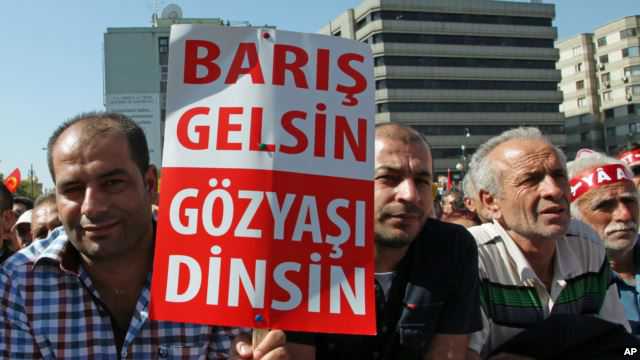Dorian Jones
October 22, 2013

FILE – Thousands of Alevi Muslims, members of Turkey’s largest religious minority group, with some holding banners that read “Let’s make peace and stop bloodshed” rally in Ankara.
ISTANBUL — Alevi Muslims, Turkey’s largest religious minority, are widely seen as the biggest losers in the government’s recent package of democratic reforms.
Recognition of Alevi religious rights was widely expected to be included among the reforms, and Prime Minister Recep Tayyip Erdogan has said such a step could be taken after the issue is further studied. But the issue of Alevi religious rights remains deeply contentious, with many of the prime minister’s grassroots Sunni supporters viewing Alevis, who do not pray in mosques, as heretics.
Prime Minister Erdogan’s democracy package included few reforms for the Alevis other than renaming a state university after an historical Alevi figure.
Cengiz Aktar, a political scientist and columnist for the Turkish newspaper Taraf, says religious prejudice is behind the lack of such reforms.
“Nothing came out except one name of a university, because they don’t consider and they don’t want to consider the Alevis as a religion. They consider it as a deviation,” said Aktar.
Alevis practice Islam in a manner very different from the mainstream. There is no segregation of men and women during prayer, and Alevis pray in cemevis – which are prayer houses – rather than mosques. The Turkish state views cemevis as cultural centers rather than places of worship.
Professor Istar Gozaydin, an expert on religion and the state at Istanbul’s Dogus University, says the ruling AK Party has been groundbreaking in opening a dialogue with Alevi spiritual leaders. She doubts, however, that it will introduce any major reforms in this area.
“When they perceive Alevis as a color in the [Turkish] culture, that is perfectly all right. But when it comes to perceiving them as (a) different perception of Islam, that makes it difficult. It is important, because unless they start accepting it as another understanding of the religion, it’s out of the question to come to an understanding of each other,” said Gozaydin.
Alevi leaders have strongly criticized the government’s failure to meet their demands. And even before the government’s democracy package, criticism had already been growing in the Alevi community over the prime minister’s comments on Syria.
Ali Kenanoglu heads the Hubyar Sultan Alevi Cultural Association.
“Whenever Mr. Erdogan talks about Syria, he refers to Syrian President Bashar al-Assad as an Alevi, which legitimizes the view in Turkey that Alevis are responsible for massacring Sunnis in Syria. And the Turkish prime minister’s audience is Sunni Turks, who already have very troubled relations with the Alevis,” said Kenanoglu.
In the past few months there have been clashes between protesting Alevis and security forces in various parts of Turkey. Some government officials have voiced support for recognizing Alevi cemevis as places of worship.
But AK Party parliamentary deputies have expressed strong opposition to such a move.
Kadri Gursel, diplomatic columnist for the Turkish newspaper Milliyet, warns that sectarian tensions are on the rise.
“It’s becoming most serious, because there is a patchy Alevi rebellion in Turkey right now, in the Hatay region, in Ankara, in Istanbul. There is a deepening resentment among Alevis, and the Alevi question is a threat to the public order in Turkey right now,” said Gursel.
While Alevi leaders have called for mass protests in Istanbul next month, the government has promised to examine the issue of Alevi rights. But the findings of an inquiry initiated by the government two years ago still remain unenforced. Observers point out that Turkey is entering a period of political campaigning 18 months ahead of the next general election, and Erdogan may therefore be reluctant to introduce significant Alevi reforms.
via Tensions Rise Between Turkey’s Government, Alevi Minority.